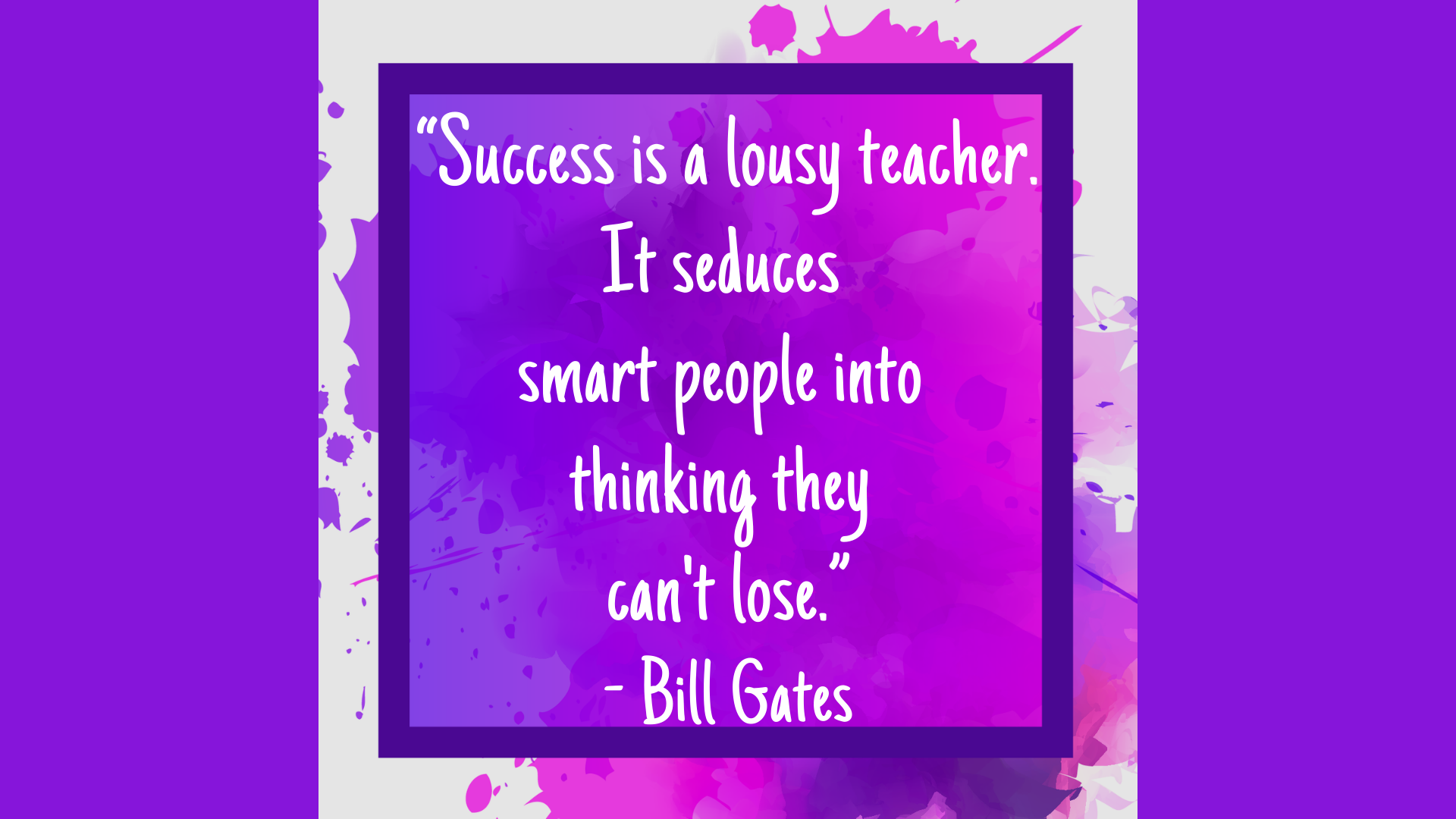Kay:
Hey there Questers and welcome back. It is Monday, May 10th, and this is episode 351. We have a quote for you today from a very recognizable American businessman Mr. Bill Gates. He says, “Success is a lousy teacher. It seduces smart people into thinking they can’t lose.”

Shi:
Well, Bill Gates, obviously one of the most successful people of all time so he certainly knows a thing or two…
Kay:
I think he’s like the second richest guy on the planet.
Kay:
Big deal.
Shi:
…about success. Yeah, him and Elon and…
Kay:
Jeff Bezos.
Shi:
…Bezos all kind of compete there up in the top three. So, no doubt he’s experienced quite a bit of success. So, when you have someone who’s reached that level, say that success is a lousy teacher it’s good to listen.
Kay:
Right. Well he’s really smart, which means he’s learned a lot of things and he’s had a lot of success. So, he’s clearly seen what has been effective and hasn’t been in regards to giving him lessons. If you look back and maybe audit the successes and failures of your own life, you can probably see that you don’t learn a whole lot when you’re winning.
Shi:
You learn that you feel good. You might be thinking well, yes, I do learn. You learn what makes you happy? You learn what feels good. You learn your own standard.
Kay:
We’re not saying you don’t make gains.
Shi:
Yeah. You may gain. Exactly, well-articulated, but when it comes to learning and finding a lesson in something and being altered from that, most of us find that in those failures, in those moments where things don’t go the way you expect it. Reality does not match your expectations and therefore we get some pain, but with the pain that comes the, if you’re smart about it, the moment to reflect, to look at what could have been done differently, where things could have been better and how ultimately you could have performed better. That’s where you end up making course corrections and behavior alterations, which then do lead to success.
Kay:
I think it’s Ray Lewis who says turn your pain to purpose. So, finding that lesson within the failure. But one of the things I love about this quote is that Bill Gates says that success seduces smart people into thinking they can’t lose. I always remember watching football with our dad. We totally have the typical nineties dad as a football watcher yelling at the TV, getting excited about the touchdowns, and then muting during the commercials, and everyone would take their potty break and come back.
Shi:
Throw the football around in the neighborhood for a little bit.
Kay:
Exactly. Just to get warmed up for the game that was coming, and I would always remember that if a team was doing super well in the first half, dad would be coaching us during halftime telling us how to watch when they came out that in the second half, their late-game performance is probably going to dip.
Shi:
Because when you’re doing so good in the first half, it’s easy to “rest on your laurels.” But to feel like you’re doing good to feel like, well, the effort that I’m putting in now suffices. But of course, most of us, when we were cruising, tend to kind of get a little distracted, get a little more relaxed, start to let our minds wander and expand. Meanwhile, when you’re behind you are solely focused on how do I catch that person in front of me? How do I get better? How do I make the differences in my move so that I can win the game? That’s why ultimately we see teams pull ahead and we see this in life too.
Kay:
I think this is one of the reasons that Bill Gates founded Microsoft and Microsoft had its heyday in the computer market, but a huge rival came into play in the 2000s and then completely obliterated Microsoft’s presence in the phone market, which was Apple, which happens. Bill Gates has even said in his memoir that he looks back and sees that a lack of innovation was at the forefront of them not being able to adapt to new technology. So, from like one of the most successful people of all time, he’s saying that it can seduce you into thinking that you can’t lose. He has lost big time and watched another player come into the market and take the market share for the future.
Shi:
He’s not the only big player that’s lost. I mean, every brand from Disney to Coke, to Samsung, to Ford, to McDonald’s. So many more, have these epic failure stories, these massive blenders, and missteps. We have a history full of them and we often attribute to that when people say like, gosh, you guys have made it so far and you do so much. How is that so? It’s because we’ve made a lot of mistakes, because we’ve messed up so many times and we’ve learned a lot of hard lessons, but we didn’t quit. We just got up and we cried about it and we wiped off our chin and we said, what can we do better next time? We kept going, which comes back to that kind of meta advice we always give, which is that consistency compounds. But consistency hurts and it’s painful and sometimes it’s consistently doing something wrong until you make a change to get it right. I love that example of Bill Gates. His ultimate success becoming such a sloppy teacher and seducing him into thinking that he couldn’t lose. So, to remind you what Mr. Bill Gates said it is, “Success is a lousy teacher. It seduces smart people into thinking they can’t lose.”
Kay:
Alrighty, gang, you got a Success Quest today. We want you to get out and prepare for future success by uncovering the message that may be waiting for you to uncover within your mess. Yes, there’s a mess inside your message and we want you to find it. What lesson can you gain from a loss in order to inform your future successes to come? Are you ready?
Kay & Shi:
Let’s quest!




